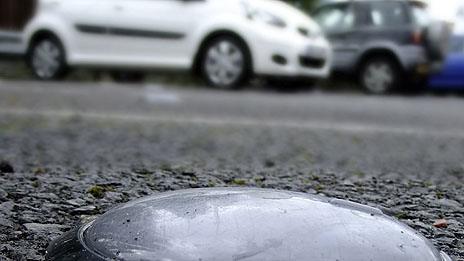Will Westminster's parking sensors set a new trend?
- Published
- comments
Is technology the answer to London's parking problems? BBC London's Tom Edwards finds out
Parking in Westminster is difficult at the best of times.
The council estimates that half a million vehicles travel in and out of central London a day.
Of course this puts a huge strain on the number of available parking bays.
Now the council is trialling a new technology to make it easier to find a space.
It's early days but the technology seems to work, albeit a very small trial.
New technology
What's interesting about Westminster City Council, external is it sets the trends for parking across the country.
What happens first here is usually copied.
It introduced the first parking meter and also pioneered paying by phone.
It is also now a totally cashless parking operation.
So why introduce new technology?
Parking is a big money spinner for Westminster - last year it brought in a whopping £38.1 million.
That money is spent only on transport projects but it does mean that it doesn't have to spend other income on those projects.
We know Westminster wants to maximise its parking income - it was one of the reasons it tried to introduce the controversial late night parking charges.
That was defeated.
So instead why not make the system more efficient and turn over the bays quicker?
The council claims drivers spend 10-15 minutes on average trying to find a parking spot.
So why not make it easier and increase revenues by telling drivers where there is a space and get them paying and not circling?
Parking bays
My hunch is the future of parking will be based on sensor technology.
It's not quite there yet but the next generation of parking apps will probably be integrated into your car's sat-nav.
Then when you drive into a parking spot, you'll be charged automatically.
We are probably some way from getting rid of traffic wardens.
Some drivers will always park illegally, but we could be a step closer to an automated parking system on the street.
Will it work elsewhere?
Let me know your thoughts.
- Published16 August 2012

- Published18 January 2012